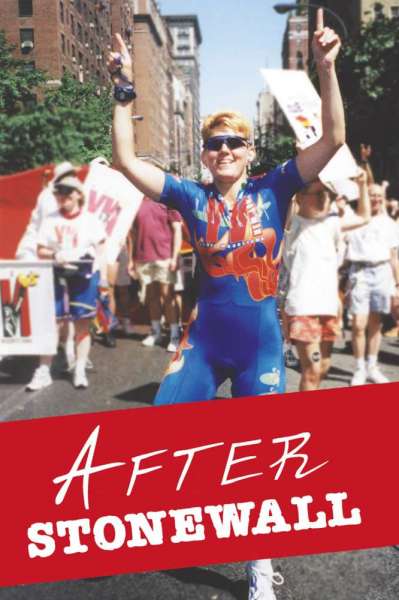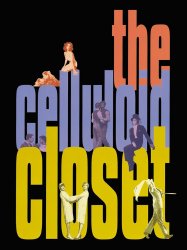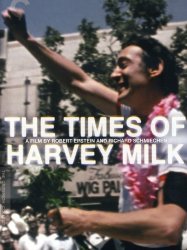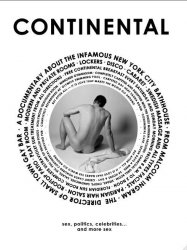After Stonewall is a american film of genre Documentary released in USA on 6 june 1999 with Larry Kramer
After Stonewall (1999)

If you like this film, let us know!
Released in USA 6 june 1999
Length 1h28
OriginUSA
Genres Documentary
Themes Films about sexuality, LGBT-related films, Documentary films about historical events, Documentaire sur l'homosexualité, LGBT-related films, LGBT-related film
Rating74%










After Stonewall is a 1999 documentary film directed by John Scagliotti about the 30 years of gay rights activism since the 1969 Stonewall riots. It is the sequel to the Scagliotti-produced 1984 film Before Stonewall and is narrated by musician Melissa Etheridge. Participants include Dorothy Allison, Jewelle Gomez, Rita Mae Brown, Craig Lucas, Arnie Kantrowitz, Barbara Gittings, Barbara Smith, Larry Kramer and Barney Frank.
Actors
Comments
Leave comment :
Suggestions of similar film to After Stonewall
There are 7 films with the same actors, 8861 with the same cinematographic genres, 8837 films with the same themes (including 17 films with the same 6 themes than After Stonewall), to have finally 70 suggestions of similar films.If you liked After Stonewall, you will probably like those similar films :

Before Stonewall (1984)
, 1h27Directed by Greta Schiller
Origin USA
Genres Documentary, Historical
Themes Films about sexuality, LGBT-related films, Documentary films about historical events, Documentaire sur l'homosexualité, LGBT-related films, LGBT-related film
Actors Rita Mae Brown
Rating74%






Gay Sex in the 70s (2005)
, 1h7Origin USA
Genres Documentary
Themes Films about sexuality, LGBT-related films, Documentary films about historical events, Documentaire sur l'homosexualité, Documentary films about cities, LGBT-related films, LGBT-related film
Actors Larry Kramer, Bette Midler
Rating69%





The film opens with a rapid montage of visuals that transport people back to the 1970s in and around Greenwich Village. Driving disco music of the time sets the pace. Using intimate interviews it begins to develop the story of gay sex in the 70′s through characters such as Larry Kramer, Scott Bromley, Barton Benes, Rodger McFarlane, and others. These characters begin to expand the elements that were visually introduced. They talk about the public sex: the streets, the piers, and the trucks.

The Celluloid Closet (1996)
, 1h47Directed by Rob Epstein, Jeffrey Friedman
Origin USA
Genres Drama, Documentary, Historical
Themes Films about films, Films about sexuality, Bisexuality-related films, LGBT-related films, Documentary films about business, Documentary films about the film industry, Documentaire sur l'homosexualité, Documentary films about cities, LGBT-related films, LGBT-related film
Actors Susan Sarandon, Lily Tomlin, Armistead Maupin, Arthur Laurents, Antonio Fargas, Tom Hanks
Rating77%





Le film montre comment le cinéma hollywoodien a évoqué le thème de l’homosexualité, comment cette représentation a évolué au fil des ans et comment, en retour, elle a influencé la perception de l’homosexualité par le grand public.

Sex Positive (2009)
Directed by Daryl Wein
Origin USA
Genres Documentary
Themes Medical-themed films, Films about sexuality, LGBT-related films, Documentaire sur l'homosexualité, Documentaire sur une personnalité, Documentary films about health care, LGBT-related films, HIV/AIDS in film, LGBT-related film
Actors Michael Lucas, Larry Kramer, Susan Brown
Rating65%






Positive (1990)
, 1hDirected by Rosa von Praunheim
Genres Documentary
Themes Medical-themed films, Films about sexuality, LGBT-related films, Documentaire sur l'homosexualité, Documentary films about health care, LGBT-related films, HIV/AIDS in film, LGBT-related film
Actors Larry Kramer, Rosa von Praunheim, Ronald Reagan
Rating59%






The Times of Harvey Milk (1984)
, 1h30Directed by Rob Epstein
Origin USA
Genres Documentary, Historical
Themes Films about sexuality, LGBT-related films, Documentary films about historical events, Documentaire sur l'homosexualité, Documentaire sur une personnalité, Documentary films about politics, Documentary films about cities, Political films, LGBT-related films, LGBT-related film
Actors Harvey Fierstein
Rating81%





The Times of Harvey Milk documents the political career of Harvey Milk, who was San Francisco's first openly gay supervisor. The film documents Milk's rise from a neighborhood activist to a symbol of gay political achievement, through to his assassination in November 1978 at San Francisco's city hall, and the Dan White trial and aftermath.

Ballot Measure 9 (1995)
, 1h12Origin USA
Genres Documentary
Themes Films about sexuality, LGBT-related films, Documentary films about historical events, Documentaire sur l'homosexualité, Documentary films about politics, Political films, LGBT-related films, LGBT-related film
Rating77%






Continental (2013)
Directed by Malcolm "Mo" Ingram
Origin USA
Genres Documentary
Themes Films about sexuality, LGBT-related films, Documentary films about historical events, Documentaire sur l'homosexualité, Documentary films about cities, LGBT-related films, LGBT-related film
Rating73%





 , 57minutes
, 57minutesOrigin USA
Genres Documentary
Themes Films about music and musicians, Films about sexuality, LGBT-related films, Documentary films about historical events, Documentaire sur l'homosexualité, Musical films, LGBT-related films, LGBT-related film
Rating71%






Où sont nos amoureuses (2007)
, 53minutesDirected by Robin Hunzinger
Origin France
Genres Documentary
Themes Feminist films, Politique, Films about sexuality, LGBT-related films, Documentary films about historical events, Documentaire sur l'homosexualité, Political films, LGBT-related films, LGBT-related film, Lesbian-related films
Ce film documentaire raconte le destin de deux jeunes femmes, Emma Pitoizet et Thérèse Pierre, professeures toutes les deux, dans les années 1930 et qui tentent de construire ensemble une vie à la fois engagée et amoureuse. L’été 35, elles font « le voyage en URSS » et songent à adopter un enfant. Leur émancipation va se transformer en apprentissage douloureux puis en épreuve. En 40, après avoir brutalement rompu, elles se trouvent confrontées à la catastrophe : Emma, mariée, vivra dans une Alsace annexée par l’Allemagne nazie, et s’y reniera dans la douleur. Thérèse s’engagera dans la Résistance en Bretagne. Arrêtée par la Gestapo, elle meurt sous la torture en 43. Elle n’a pas parlé.
 Connection
Connection



